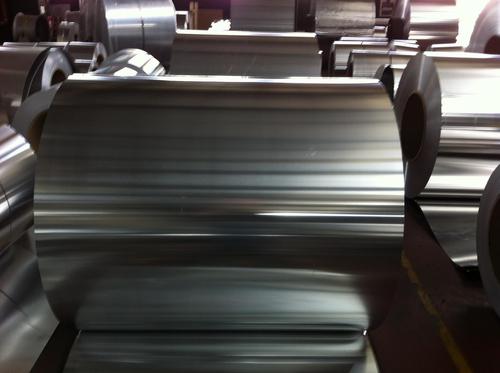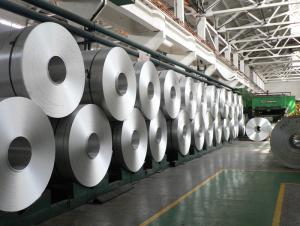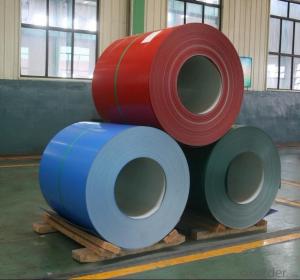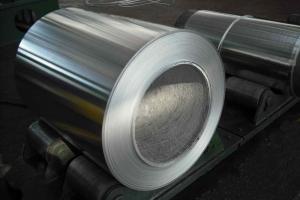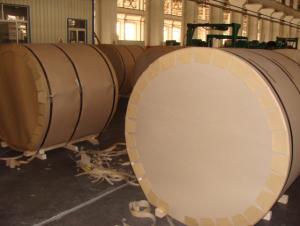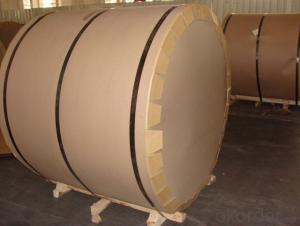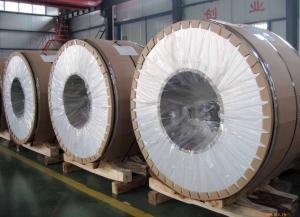Acm Aluminum Coil Stock AA8079 Aluminium Coil
- Loading Port:
- China Main Port
- Payment Terms:
- TT or LC
- Min Order Qty:
- -
- Supply Capability:
- -
OKorder Service Pledge
OKorder Financial Service
You Might Also Like
1、 Structure of Aluminium Coil Description
Disposable aluminum Coil air food boxes is able to endure high low temperature (20-250) molecular structure stability don't change packing materials. Compared with the current widespread use of plastic snack box can only carry temperature range is - 16 to 85, it can take food from refrigerator to oven to table, and do not need to change container.
2、Main Features of the Aluminium Coil
Alloy: | A1100, A3003, A3004, A5005, A8011 etc. |
Temper | H14, H16, H18, H24 etc. |
Thickness | From 0.024mm to 1.2mm |
Width | From 56mm to 1600mm |
Color | Customized, you can choose from our color chart, or we adjust the special color as the samples you offer. |
Coating | PE coating, PVDF coating, Back coating |
Coating thickness: | 0.18mm for PE coating, 0.25mm for PVDF coating |
3、 Aluminium Coil Images
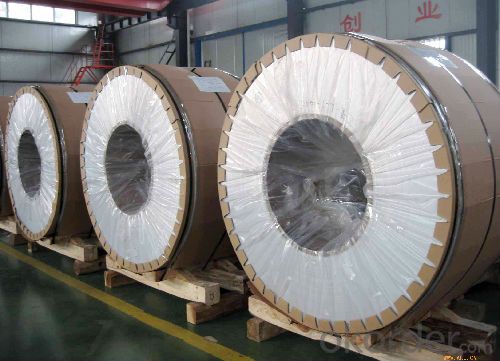
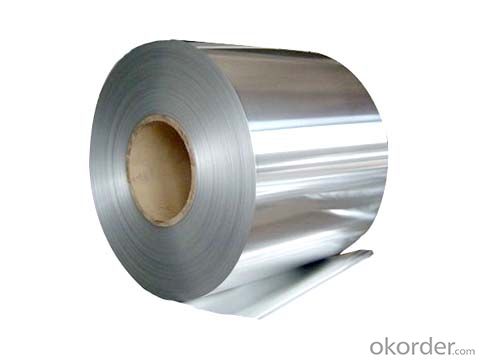
4、Aluminium Coil Specification
Alloy: | A1100, A3003, A3004, A5005, A8011 etc. |
Temper | H14, H16, H18, H24 etc. |
Thickness | From 0.024mm to 1.2mm |
Width | From 56mm to 1600mm |
Color | Customized, you can choose from our color chart, or we adjust the special color as the samples you offer. |
Coating | PE coating, PVDF coating, Back coating |
Coating thickness: | 0.18mm for PE coating, 0.25mm for PVDF coating |
5、FAQ of Aluminium Coil
a. What is monthly capacity
---CNBM is one stated own company and our monthly capacity is about 2000tons.
b. Now which countries do you export your goods?
----Now we export to South East Asia,Africa, North America,South America ect.
- Q: This question asks for criteria or methods to determine if an aluminum coil is of high quality.
- <p>To identify a high-quality aluminum coil, consider the following factors: purity level, which should be 99.5% or higher for most applications; surface finish, ensuring it's smooth and free from defects; thickness consistency, which should be uniform across the entire coil; mechanical properties, such as tensile strength and elongation, that meet industry standards; and adherence to specific alloy grades for particular applications. Additionally, check for certifications from recognized standards organizations and consider the supplier's reputation for quality and consistency.</p>
- Q: What are the potential applications of painted aluminum coils?
- Painted aluminum coils have a wide range of potential applications due to their durability, versatility, and aesthetic appeal. One of the most common applications is in the construction industry, where painted aluminum coils are used for roofing and siding materials. The painted coating enhances the longevity of the aluminum by providing protection against corrosion, UV rays, and harsh weather conditions. Additionally, painted aluminum coils find applications in the manufacturing of transportation vehicles. The lightweight nature of aluminum makes it an ideal material for automotive parts, such as body panels and trim. The painted coating not only enhances the appearance of the vehicle but also provides a protective layer against scratches and dents. Another potential application of painted aluminum coils is in the production of household appliances. The painted coating adds a distinct finish to appliances like refrigerators, ovens, and washing machines, making them more visually appealing. Moreover, the protective layer helps to prevent damage from everyday use, increasing the lifespan of the appliances. Furthermore, painted aluminum coils find use in the signage industry. The ability to apply vibrant colors and designs on the coils makes them suitable for creating eye-catching signs and billboards. The durability of the painted coating ensures that the signage remains vibrant and intact even in outdoor environments. In the furniture industry, painted aluminum coils can be used for manufacturing various pieces such as chairs, tables, and cabinets. The lightweight nature of aluminum makes the furniture easy to move and transport, while the painted coating adds a stylish and modern touch to the designs. Overall, the potential applications of painted aluminum coils are vast and diverse, ranging from construction and automotive to appliances, signage, and furniture. The combination of durability, versatility, and aesthetic appeal makes painted aluminum coils a popular choice in various industries.
- Q: What is the corrosion resistance of aluminum coils in saltwater environments?
- Aluminum coils have excellent corrosion resistance in saltwater environments due to the formation of a protective oxide layer on their surface. This oxide layer acts as a barrier, preventing direct contact between the aluminum and the corrosive saltwater, thereby reducing the risk of corrosion.
- Q: Explain the key differences between aluminum coil welding and soldering processes.
- <p>Aluminum coil welding and soldering are two distinct methods used in metal joining. Welding involves the fusion of aluminum coils using heat to create a strong bond between the metals. This process can be done with various techniques such as MIG, TIG, or laser welding, and it results in a permanent joint. Soldering, on the other hand, is a process that uses a filler metal with a lower melting point than the base metal (aluminum in this case) to join the materials. The joint is not as strong as a welded joint, and the process does not involve melting the base metal. Soldering is often used for electrical connections or when a less permanent bond is required. In summary, welding creates a stronger, more permanent bond by melting the base metal, while soldering uses a filler metal to create a less permanent bond.</p>
- Q: I have been trying to make some thermite for a while now, and I haven't had much success. I have tried using iron oxide and that didn't work. then I tried using manganese dioxide, also without success. I'm pretty sure I have the right proportions for each of the corresponding oxides, but it just isn't working. I am using magnesium ribbon to light it.The aluminum I am using is the byproduct of me trying to cut a block of aluminum with a hacksaw (best way I have available to cut it) and there is a lot of aluminum powder that is being made. But i'm not sure if it is fine enough to be effective. I don't have an etch-a -sketch so that's not an option. I know that it has to be fairly fine grained, but how small do the particles need to be?FOR EVERYONE WHO IS GOING TO TRY AND TELL ME THAT MAKING THERMITE IS DANGEROUS OR SOMETHING ALONG THOSE LINES......DONT!!!!!!!!.......... IM NOT GOING TO LISTEN SO SAVE YOURSELF THE TYPING AND ME THE READING
- In 35+ years of demonstrating the thermite reaction, I have used fine aluminium powder to quite visible small bits. The proportions don't seem too critical, but try and keep near the amounts represented by the balanced eqtn. The difficult bit is getting the wretched stuff to ignite. With some mixes several strands of magnesium ribbon as fuse still wouldn't get it to ignite. I found a pile of 'ignition powder' at the base of the Mg often helped. There was a good commercial one available in the UK but I often made one up, main ingredients barium peroxide and magnesium powder, about 50/50. Needless to say, ignite with this mix where you won't breathe any nasty fumes. To get a good result, if I didn't use a proper crucible, I shaped one of Al foil about the capacity of 2-3 eggcups. This was put on sand in a big coffee tin, then more sand added to fill round the sides. This would give a good amount of iron. I once made the mistake of rushing in too quickly to get out the red hot iron.... and completely melted the ends of a large pair of Nickel tongs!
- Q: Can aluminum coils be used in food storage facilities?
- Aluminum coils are capable of being employed in food storage facilities. The food industry extensively employs aluminum due to its exceptional properties, including its lightweight nature, durability, resistance to corrosion, and effective heat conductivity. These attributes render aluminum coils suitable for a variety of applications within food storage facilities. Refrigeration systems, air conditioning units, and food storage cabinets are just a few examples of where aluminum coils can be utilized. Furthermore, aluminum is non-toxic and has no adverse reaction with food or its flavor, thus establishing it as a secure option for food storage. However, it is crucial to ensure that the aluminum coils used in food storage facilities undergo proper cleaning and maintenance to prevent any potential contamination.
- Q: What kind of sensor is appropriate for aluminum coil thickness measurement?
- Thickness measurement can be divided into single-point and two-point thickness measurement, the principle of which is to measure thickness of aluminum coil through distance measure sensor. Single-point thickness measurement is to calculate the thickness by measuring the distance between the aluminum coils and then subtracting the distance with fiducial point. Double-point thickness measurement is to calculate the thickness by setting a proper distance between two sensors, putting the aluminum coil between them and measuring the distance and then subtracting the distance with initial distance, which is more accurate than single-point measurement. (Professional thickness measurement sensor is also based on single-point or two-point thickness measurement.) The distance measurement sensor can be divided into laser sensor, eddy current sensor and so on. The measuring range of laser sensor is larger than that of eddy current sensor, but less accurate. The While the accuracy of eddy current sensor is around 0.01%, and the measuring range is around several millimeters to more than ten millimeters.
- Q: What are the different types of alloys used for aluminum coils?
- There are several types of alloys commonly used for aluminum coils, including 3003, 5052, and 6061. Each alloy has its own unique properties and applications in industries such as automotive, construction, and aerospace.
- Q: This question asks about the environmental impact of aluminum coils, which are commonly used in various industries.
- <p>Aluminum coils have both positive and negative environmental impacts. On the positive side, aluminum is highly recyclable, and its use in coils reduces the need for raw material extraction, thus conserving natural resources. The recycling process also consumes less energy compared to primary aluminum production, reducing greenhouse gas emissions. However, the production of aluminum coils involves energy-intensive processes that can contribute to carbon emissions. Additionally, if not properly managed, the waste from aluminum production can pollute water bodies and soil. Overall, the environmental impact depends on the balance between recycling and production practices, as well as waste management.</p>
- Q: Can aluminum coils be used in electrical wiring applications?
- Yes, aluminum coils can be used in electrical wiring applications. Aluminum has been used as a conductor in electrical wiring for many years, especially in residential and commercial buildings. It is a lightweight and cost-effective alternative to copper. Aluminum coils are commonly used in applications such as power distribution, transformers, and motors. However, it is important to note that aluminum has different electrical and mechanical properties compared to copper, so proper installation techniques and connectors specifically designed for aluminum wiring should be used to ensure safety and efficiency.
Send your message to us
Acm Aluminum Coil Stock AA8079 Aluminium Coil
- Loading Port:
- China Main Port
- Payment Terms:
- TT or LC
- Min Order Qty:
- -
- Supply Capability:
- -
OKorder Service Pledge
OKorder Financial Service
Similar products
Hot products
Hot Searches
Related keywords

